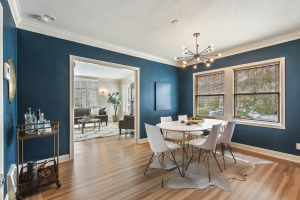
Real estate in the time of COVID. I am somewhat reluctant to write this article.
Back in January, when I submitted my last column to the magazine’s editor, COVID had not quite taken hold of our country. In anticipation of the spring market, I wrote about staging – how it can help you to sell your home, top tips, hacks, and sure-fire ways to up the anti and maximize your bottom line.
And then, by the time the magazine was published, we were in lockdown, and staging, never mind real estate in general, was the furthest thing from anyone’s mind, even mine. We were all just taking one day at a time. Terrified. Holding on to those we held dear and counting the days. Seeing the article in print felt inappropriate. Trivial.
So, you may understand that writing anything about the real estate market during a pandemic, where we really don’t know what’s around the corner can seem a little…risky. But for you, I’ll take the risk. I know that many of you are teetering on making big decisions about your own living situations – maybe you’re thinking of buying outside of the city or you’re committed to NYC but desperate for more space to accommodate your new normal. So, while what I write in this column today might seem inappropriate, trivial, ill-conceived, or just plain wrong months from now (because I, like all of you, do not have a crystal ball), my hope is that now, right now, this might be helpful.
Because home is everything. Especially now. So! Real estate in the time of COVID. As an agent in the community, there is not a day that passes where someone doesn’t ask me about the market, so I’m going to do my best to answer the three questions I’m being asked most often right now.
I hope this helps.
Q: Is now a good time to buy or should I wait and see what happens with the market?
A: Now is a GREAT time to buy.
Manhattan is officially a buyer’s market, and it looks like Brooklyn is beginning to follow suit although right now Brooklyn is still definitely seeing more activity than Manhattan, and we’re seeing most of that movement under the $2M price point. With rising, inventory buyers have more choice and therefore more leverage, and mortgage rates are spectacularly low. At the time of writing this, the average 30-year fixed mortgage rate just dropped to a historic low of 2.86%, according to data released by Freddie Mac, which has tracked rates since 1971.
While this means more spending power for buyers (which is good news for everybody), I wouldn’t take mortgage rates for granted. While inflation remains low, so will the rate, but inflation will eventually rise. Indeed, the Fed recently announced a major policy shift geared towards lifting inflation – and with rising inflation come rising mortgage rates. Simple as that. With the Fed also unlikely to raise the Federal Funds Rate for years, savings accounts will continue to offer pretty much nothing in terms of interest, and we’re all aware of the rollercoaster the stock market is on right now. Owning real estate, therefore, is a great hedge against rising inflation and remains one of the best-forced savings accounts out there (and the only one you get to live in) particularly as home prices will likely climb hand in hand with inflation.
While deals are out there – all the buyers I represent right now who entered contract recently had offers accepted for under ask or after a price reduction – we’re also seeing highest and best and multiple bid situations for well-presented and/or strategically priced properties. However, it’s a nuanced market, depending on price point, location, and property condition and the traditional selling seasons are not as defined this year.
I’d advise against trying to time the bottom of the market. It’s possible that we may already be there and honestly, nobody ever knowingly buys at the bottom and price reductions can often reinvigorate buyer interest and even spark bidding wars. I’d focus instead on finding a property that works for you now and for years to come and get the best deal, you can while conditions are optimal. Think about what’s important to you and your family. The security of living in a home that makes you feel safe and comfortable and gives you space and flexibility you need during these challenging times is priceless.
Q: Is now a good time to sell or should I wait?
A: Well, that depends….
If the last five months have taught us anything it’s that the new normal is much more home-based, and buyers are more aware than ever of the inadequacies of their homes. Buyers who are out there looking to make a purchase are incentivized to take advantage of interest rates and ready to make a deal. However, while the high buyer demand we saw in January and February of this year has been deferred rather than particularly diminished, I wouldn’t take it for granted.
I’ve been asked a lot whether it makes sense to wait until spring to list, but honestly, that’s an impossible question to answer. Nobody knows what the future holds and with the upcoming election and ongoing pandemic, the market could go up OR down early next year. That’s why it’s important to identify your goal – whether that’s to make the most profit possible, or to secure a new home that works better for you and your family.
For instance, if you’ve only owned your place in Park Slope for 3 or 4 years, unless you bought at under market value or you’ve made some significant upgrades I wouldn’t expect to walk away with a huge profit. Prices in Park Slope have not risen as exponentially as they did between 2014 and 2016 in the last few years and have flattened out considerably in comparison, so once you factor in closing costs (these will be higher for townhouse and condo owners than for those selling coops) you might not be looking at a big chunk of change after all’s said and done. So, if your main priority is getting a good return on your investment, but you’ve not owned your home for long and don’t have to sell, you may choose to wait it out for a couple of years before taking your home to market and look at refinancing for a lower rate in the meantime.
If, however, you’re in the same situation but selling because it’s a means to an end – maybe you’re looking to relocate out of the city and your sale would enable you to do that, then my best advice is to focus on what the sale allows you to achieve rather than on how much profit you make. For instance, if you’re moving out of town to a cheaper neighborhood you may be looking at a significantly lower mortgage for a significantly bigger property, so a smaller profit than you’d hoped can be negated over time in the money you save in mortgage payments. And of course, it gets you to where you want to be. A home that works for you and your family.
If you’re trading up you may actually stand to make money rather than lose it. When you’re selling in a down market, remember you’re also buying in a down market. Let’s do the math. Say your $1M home sells for 10% below ask, but that $1.5M home you’re buying also sells for 10% below then you’ve actually come out with $50K in hand. Look at it the other way: if you sell for 10% above $1M at $1.1M but buy at 10% above $1.5M at $1.65M, you’ve gained $100K in your sale but had to shell out an extra $165K in your purchase. Of course, the aim is to sell for more and buy for less, but this isn’t realistic unless you’re selling something great and buying something, um, not so great, or which requires time and money to renovate. And by the way, before you start worrying that you should expect a 10% price drop, don’t worry, I’ve used that rate for illustrative purposes only!
Lastly, as I’ve already touched on earlier in this article, inventory has been on a steep increase since quarantine came to an end, so competition amongst sellers is on the rise too. That means it’s more important than ever to price right if you do decide to sell now, or you may run the risk of having your home stagnate on the market. Make sure to have your broker run an extensive market analysis and take into consideration both recent sales prices as well as prices for current comparable homes when deciding on your listing price. If you fail to price correctly or realistically, you may find you don’t receive any offers, or even worse, not have any showings.
Q: I want to rent a new place – how can I get a good deal?
A: It’s a renter’s market! Use that leverage!
With apartment inventory in New York City at highs not seen for over a decade, rental prices have trended downwards in some neighborhoods and landlords have been forced to offer concessions in order to secure tenants. Manhattan’s rental market has taken the worst hit with August vacancy rates soaring to 5.1% for the first time in 14 years, an increase from just 1.9% in August of 2019, according to appraisal firm, Miller Samuel. The Brooklyn market is proving to be more resilient with narrower price concessions, although Miller Samuel still reports inventory at an 11-year high.
As I write this, there are currently 598 apartments available for rent in Park Slope. Of those 201 are being offered either without a broker fee or with free rent (or if you’re lucky, both).
If there was ever a time to negotiate a good deal, therefore, it’s now. Rather than waiting to see where prices might bottom out, I’d recommend proposing terms that work for you, whether that might be a lower rent, or even a period of free rent. The length of the lease may also be up for negotiation – anecdotally I’ve been asked by a lot of tenants for shorter leases as uncertainty about job stability is putting people off making long term commitments.
If you happen upon an apartment you like, but there’s a broker fee (it’s currently still legal for tenants to pay broker fees in New York), ask the listing broker if the landlord would consider paying all or part of it. If you’re looking for a longer lease, now may also be the time to request that. Put it this way, if I was a landlord right now, I’d be delighted to secure a tenant for 2 years rather than risking another period of vacancy after a year of leasing.
Ultimately, while inventory remains high, there are just so many choices that you really have nothing to lose and everything to gain by negotiating.
So! I hope that answers some of your questions. Bear in mind that New York City and even Park Slope itself are a collection of ‘micro-neighborhoods’ which can vary significantly in terms of desirability and pricing, so while the information I’ve shared here answers some of the most burning questions, the only way to get accurate advice and data specific to your own unique situation is to reach out to an agent to talk through your options. An agent worth their salt, will give it to you straight and not encourage you to buy or sell if it’s not in your best interests financially.
If you’d like to discuss anything in this article further or have other questions about the market or your own goals, feel free to reach out to me at Lindsay.owen@compass.com and I’m happy to provide you with all the information you need to make an informed decision for you and your family.
Until next time!
Lindsay xo







